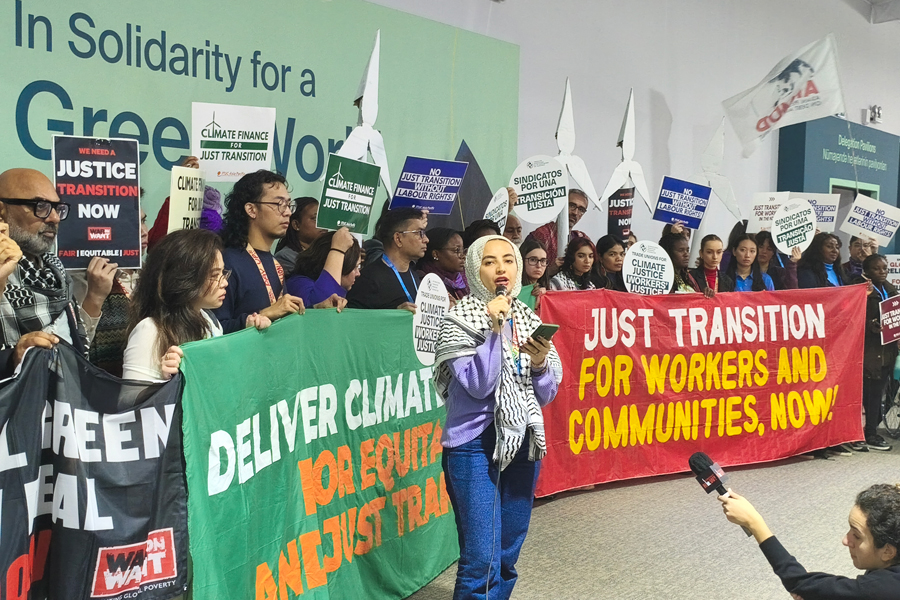Global North’s reluctance to commit to ‘just transition’ fuels concern at COP29
Bangladesh places its $180b need for carbon mitigation target within 2030

Yasir Wardad from Baku, Azerbaijan
Published :
Updated :

As the 29th Conference of the Parties (COP29) enters its eighth day today (Monday), tensions are rising over the lack of concrete commitments from developed nations, particularly those in the Global North, to finance a ‘just transition’ for climate-affected communities.
Despite growing calls from vulnerable nations, environmental groups, and civil society, wealthier countries have yet to pledge the trillions of dollars needed to ensure a fair shift toward sustainable economies.
The concept of a “just transition” refers to a climate policy approach that not only addresses the environmental crisis but also ensures that the social and economic impacts on workers and communities are taken into account.
This includes funding for job creation in clean energy sectors, retraining for displaced workers, and ensuring energy access for impoverished regions.
Experts have estimated that $1.5 trillions of dollars will be necessary to support this transition in developing countries within 2030.
Developed nations, which have historically contributed the most to global greenhouse gas emissions, have come under increasing pressure to provide financial support.
UN Climate Change executive secretary Simon Stiell urged delegates at COP29 to wrap up less contentious issues as early as possible this week, so there is enough time for the major political decisions before the conference ends.
“We can’t lose sight of the forest because we’re tussling over individual trees,” said Stiell, speaking at the conference’s main plenary session on the day.
“Where groups of parties dig in and refuse to move on one issue, until others move elsewhere. This is a recipe for going literally nowhere. And could set global climate efforts back at a time when we simply must be moving forward. We will only get the job done if parties are prepared to step forward in parallel, bringing us closer to common ground,” he said.
Ethnobiologist and climate activist Pavel Partho, in a protest at COP, said that despite significant discussions, no breakthrough has emerged on how to deliver the much-needed funding.
He said without a robust funding mechanism, the transition to a sustainable, low-carbon future will leave millions of vulnerable people behind.
As COP29 moves forward, the world watches to see whether the Global North will fulfill its responsibility to ensure that a just and equitable climate future becomes a reality.
Meanwhile, Syeda Rizwana Hasan, adviser to the ministry of environment, forests and climate change called for climate justice, urging the global community to uphold the principle of Common but Differentiated Responsibilities (CBDR).
“Delaying action until after 2030 is not an option. To keep the 1.5°C goal within reach, developed nations must rapidly scale up mitigation efforts and fulfill their commitments under the Paris Agreement,” she said.
The Environment Adviser said this while addressing the 2024 Annual High-Level Ministerial Round Table on Pre-2030 Ambition at COP29.
Representing one of the world’s most climate-vulnerable nations, she emphasised the urgency of collective global action to address the escalating climate crisis.
Bangladesh faces harsh realities of climate change daily, she said while focusing on the impacts of rising sea levels, intensified cyclones, erratic rainfall, and salinity intrusion.
This year alone, two catastrophic floods caused $1.7 billion in damages—equivalent to 1.8 per cent of the Bangladesh national budget, said Ms Hasan.
Over the past 18 months, the country has experienced through 15 climate-induced disasters, leaving 1.2 million people in peril.
Despite contributing less than 0.4 per cent to global greenhouse gas (GHG) emissions, Bangladesh bears a disproportionate share of the consequences.
Ms Hasan informed the parties on Bangladesh’s commitment to reduce GHG emissions by 22 per cent by 2030, targeting an unconditional reduction of 27 million tonnes and a conditional reduction of 61 million tonnes.
“Achieving these goals will require $45 billion from domestic resources and $135 billion in international financing”, she said.


 For all latest news, follow The Financial Express Google News channel.
For all latest news, follow The Financial Express Google News channel.